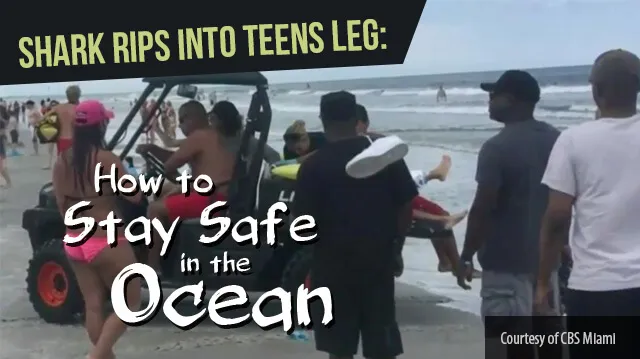Sharks have a reputation as being bloodthirsty killing machines, a view reinforced by movies and sensationalism. But after a 13-year-old boy was seriously hurt in a shark attack at a Florida beach recently, some are left asking the question: How safe is the ocean, really?
Predator in the water
The shark attack took place at Neptune Beach near Jacksonville at approximately 2:55 p.m. It left the teen with huge gash in his right calf. The eight-inch wide laceration was consistent with a five- to six-foot long shark, Neptune Beach police told NBC. Over the last half-century, there has been an increase in unprovoked shark attacks in Florida, and more between 2 p.m. to 3 p.m. in the afternoon than any other time of the day, according to National Geographic.
The injured teen was transported to a local hospital, where he remains in stable condition with non-life threatening injuries, according to police. “Bites of this nature are extremely rare for our area,” police said. Nevertheless, they urged beachgoers to “exercise caution” in the water.
Sharks get a bad rap
Being bitten by a shark is actually quite rare: Your chances are 1 in 3.7 million, to be exact, according to National Geographic. Each year the United States we average 19 shark attacks with one shark-attack fatality every two years. If you think that’s a lot, then think about this. For every human fatality that occurs because of sharks, humans kill approximately 2 million sharks.
The yearly average of unprovoked shark attacks on humans in the world is 75, resulting in approximately 10 deaths. These worldwide figures are small considering the millions of humans that enter the water each day. You have a higher chance of dying from a bee sting, a dog or snake bite or even a lightning strike than from a shark attack, according to the Florida Museum of Natural History.
Yet, you can still take precautions
Chances are fairly slim that you’ll be attacked by a shark anytime soon. But there are still precautions you can take each time you consider frolicking in waters where sharks may be present naturally.
- Since unprovoked attacks happen most often to those swimming alone, swim with a group if possible.
- Never wander too far from shore. Doing so will isolate you and make it that much harder for help to arrive if needed.
- Don’t swim at night, dawn or dusk. This is when sharks are more active and feed close to shore. They’ll see you but you won’t see them.
- Don’t ever enter the water if you are bleeding. Sharks can smell and taste blood and can trace it back to the source. It’s how they hunt.
- Don’t wear shiny jewelry that reflects light, which tends to look like shining fish scales.
- Don’t go into waters containing sewage. Sewage attracts bait fish, which in turn attract sharks.
- Avoid waters with diving seabirds. The birds are fishing for the same bait fish that attract sharks.
- Unfortunately, your brightly colored bathing suit also may attract sharks. In fact, an uneven tan may be distinguishable by a shark in murky water
- Splashing water or pets creating erratic movement in the water can attract sharks.
- Sandbars or steep drop-offs, like those you find in Hawaiian waters, are favorite hangouts for sharks.
- Swimming near porpoises won’t keep sharks at bay. In fact, sharks and porpoises often eat the same food.
- Never touch a shark if you see one!
- If attacked, the general rule is get away quickly and in any way that you can. That may mean aggressively fighting back or yelling under water. Bottom line, whatever it takes to get away safely, just do it.
Unprovoked shark attacks do happen, as was the case with the teen at Neptune Beach. And there’s no disputing sharks do kill, but people are much more devastating to sharks than they are to us.
How do you feel about swimming in the ocean? Are you more frightened now in light of the recent shark attack?
— Katherine Marko
Sources:
http://www.nbcnews.com/news/us-news/shark-attacks-teen-neptune-beach-florida-n582491
http://natgeotv.com/ca/human-shark-bait/facts
https://www.flmnh.ufl.edu/fish/discover/sharks/avoid-attacks

